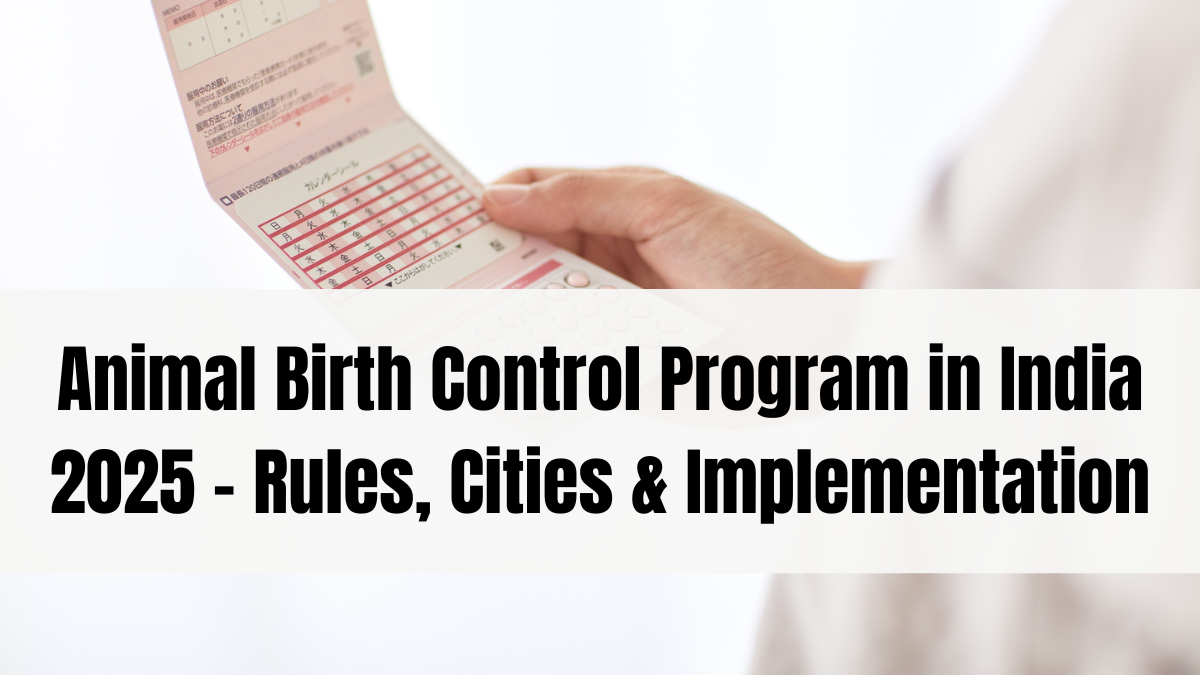India’s stray dog and animal population has long been a public concern due to overpopulation, rabies threats, and human-animal conflicts. In response, the government’s Animal Birth Control Program has emerged as a major national initiative to manage animal populations ethically and scientifically. In 2025, the program has been revamped with new rules, enhanced budgets, and stricter implementation across states.
This guide explains how the ABC program works, which cities are actively implementing it, the legal foundation behind it, and why it plays a crucial role in protecting both animals and citizens.

What Is the Animal Birth Control Program?
The Animal Birth Control Program is a central government-led initiative, primarily targeted at stray dogs and other unowned animals, to control population growth through:
-
Sterilization (spaying/neutering)
-
Anti-rabies vaccination
-
Rehabilitation of injured or unfit animals
The aim is to create a sustainable, humane, and long-term solution to street animal management without resorting to culling or cruelty.
Legal Basis of the ABC Program
The ABC Program is backed by clear legal guidelines:
| Legal Framework | Details |
|---|---|
| Animal Birth Control (Dogs) Rules, 2001 | Initial guidelines to manage stray dogs |
| Animal Birth Control (Amendment) Rules, 2023 | Strengthened sterilization & relocation laws |
| Prevention of Cruelty to Animals Act, 1960 | Bans killing or relocating sterilized dogs |
| Supreme Court Orders (2008, 2015, 2023) | Mandates sterilization and prohibits illegal removals |
The 2023 Rules brought stricter mandates, standardized protocols, and stronger accountability for urban local bodies and animal welfare organizations.
How the ABC Program Works in 2025
The 2025 version of the Animal Birth Control Program follows a five-step scientific approach:
-
Identification of strays by zonal officers or NGOs
-
Capture of animals using safe and non-cruel methods
-
Sterilization and vaccination by licensed veterinarians in ABC centers
-
Recovery and post-op care for 3–5 days
-
Release back to the exact location where the animal was picked
Each sterilized animal is marked with an ear notch or microchip and recorded digitally.
Key Cities and States Implementing ABC in 2025
The following cities and states have adopted aggressive ABC implementation, often partnering with NGOs and veterinary colleges:
| State/City | Status & Highlights |
|---|---|
| Delhi | 10 ABC centers, mobile sterilization units launched |
| Mumbai | Partnership with NGOs like WSD, over 75,000 dogs sterilized |
| Bengaluru | ABC drives in 198 wards, 24/7 helpline for rescue |
| Chennai | Fully mapped zones, weekly ABC reporting system |
| Kerala | Introduced sterilization of stray cats in addition to dogs |
| Rajasthan & UP | Major drives in tier-2 cities and rural blocks |
Municipal bodies are now mandated to submit quarterly reports to the Animal Welfare Board of India.
Budget and Central Government Support in 2025
The central government, under the Ministry of Fisheries, Animal Husbandry and Dairying, has increased funding to enhance Animal Birth Control Program efficiency:
-
₹500+ crore allocated in 2025 Union Budget for sterilization programs
-
₹50 crore specifically earmarked for capacity building and ABC training
-
Grants to NGOs for setting up sterilization centers in underserved districts
-
Incentives for veterinarians and handlers involved in ABC missions
Additionally, new monitoring apps and centralized data dashboards have been launched for transparency.
Challenges and Community Role
Despite the legal and financial framework, some challenges persist:
-
Shortage of trained veterinary staff in rural areas
-
Lack of awareness among local bodies
-
Opposition from some residential societies
-
Inconsistent funding to NGOs in smaller towns
To address this, the government encourages community involvement through:
-
Resident Welfare Associations (RWAs) supporting feeding and post-op care
-
Citizens reporting unsterilized animals via apps
-
Volunteers assisting in transport, shelter, and recovery of animals
FAQs
What is the goal of the Animal Birth Control Program?
The main goal is to humanely reduce the stray animal population and prevent rabies through sterilization and vaccination, not culling.
Are sterilized dogs allowed to be relocated?
No. As per ABC Rules and Supreme Court orders, sterilized dogs must be returned to the same location. Relocation or abandonment is illegal.
Can citizens request ABC services for animals in their area?
Yes. You can contact your local municipal corporation or partner NGO to report unsterilized animals. Many cities also have online complaint systems.
Is there any penalty for harming sterilized or vaccinated animals?
Yes. Harming such animals violates the Prevention of Cruelty to Animals Act and IPC Sections 428/429 and is punishable by law.
Are cats and other animals included in the ABC program?
While the core focus is on dogs, several states like Kerala and Delhi have started pilot sterilization programs for cats and other community animals in 2025.
Click here to know more.
